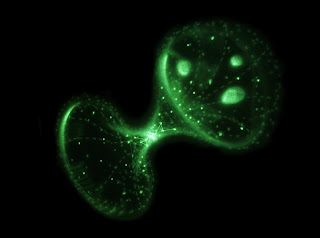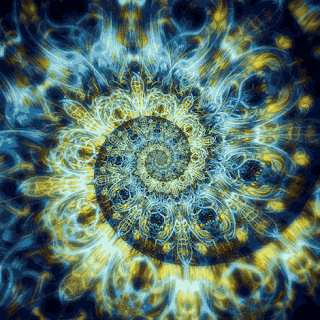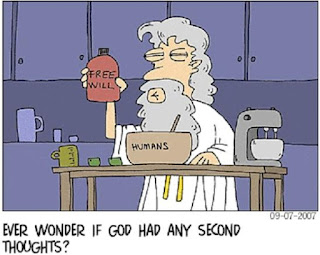Now.
If there is a "mind" out there, outside of space and time, outside of our 4 little dimensions, even outside of the 10 or 11 (or 26) dimensions that String Theory requires, even outside the concepts of dimensions at all ...
I just have to stop and think about that for a minute.
... outside of the concept of "existence" as we know it, since "existence" for us is occupying a point in space and time ...
Now I'm thinking about that.
... outside of the need to be created, since being created happens in space and time ...
Oh, my.
... outside of the laws of physics, since those arrived inside the universe, after Big Bang, inside of space and time ...
... not made of energy or matter, since those are part of this universe, arriving in this universe after Big Bang ...
... then the only word left comes from The Princess Bride.
Inconceivable.
Indeed, even much of the character of just this universe itself is inconceivable, much less anything outside of it. Most of it we will never see; so much that the part we can see is almost insignificant. Space-time bends and warps and goes away and arrives. Particles are neither here nor there but everywhere and nowhere and pop into and out of existence, empty space seethes with activity, and ...
... it may be that nothing exists but interactions, relationships.
And everything came from nothing.
So we exist in a tiny little sliver of the way the universe actually is, thinking in our naive sweet arrogance that we have a clue about what's outside.
Reminds me of a guy named Antony Flew, a British philosopher at Oxford before his death not too long ago.
He became an atheist when he was 15 years old.
At age 15, he had it all figured out.
What a fine metaphor for us all.
He stopped being an atheist when he was 81. I quoted him in the last blog.
Here's what I'm thinking.
If this "mind", this intelligence, this thing that started it all isn't God, then, well, I'm a bit terrified.
If it's just an alien that's playing with us, if we are just some science experiment by a superior being, if we are just a video game being played by some super alien adolescent, then, well, I'm a bit terrified.
There are some theories floating about in science-space about the nature of the universe. Here are just three. There's lots more.
1) The universe is a hologram.
2) It's a computer simulation.
3) We actually do kind of live in The Matrix.
They're not theories, actually. They're hypotheses without evidence.
But, still. What if something, you know, just turns off the hologram generator? Or turns off the computer simulation?
We all just ... go away.
There's nothing here but interactions anyway. Those could just ... evaporate. At the touch of some switch somewhere. Dial up the Higgs. Or the Cosmological Constant. We can't do that. But the "mind" surely can.
So if it's alright with you, I'm gonna go with the Benevolent Creator hypothesis, which, since there's evidence to support it, is actually more of a theory than an hypothesis.
"Evidence?", you say incredulously. "Evidence?", you sneer. Maybe. Or maybe you're just like, evidence? Really?
Sure. Here's the short version. Everything came from nothing in a tiny tiny tiny fraction of a second.
And it all arrived incredibly precisely tuned to produce ... everything else.
And it all seems pretty well set up to produce complex life forms.
Before we knew about Big Bang, when we thought the universe had always been here, which, as it turns out, was pretty foolish considering entropy all by itself (maybe I'll explain that later), we didn't have any questions that needed answering.
We thought we had everything figured out. Lord Kelvin said in 1900 that physics was pretty well finished. We knew how everything worked. The Royal Academy of Science in London was turning down applicants, saying we didn't need any more scientists. We were done.
Then Relativity and Quantum Theory came along, with Big Bang and the obsessive need for observers.
So now we have questions that we didn't have before.
And a Benevolent Creator turns out to be a reasonable answer to all of the questions. Not the only answer, but ... reasonable. Logical. Intelligent. Informed. Norant. Which I think is the opposite of ignorant. I may have made that up. Except of course you can find it on the internet.
Next, all of the questions.
 |
| The extra 7 dimensions. |
I just have to stop and think about that for a minute.
... outside of the concept of "existence" as we know it, since "existence" for us is occupying a point in space and time ...
Now I'm thinking about that.
... outside of the need to be created, since being created happens in space and time ...
Oh, my.
... outside of the laws of physics, since those arrived inside the universe, after Big Bang, inside of space and time ...
... not made of energy or matter, since those are part of this universe, arriving in this universe after Big Bang ...
... then the only word left comes from The Princess Bride.
Inconceivable.
Indeed, even much of the character of just this universe itself is inconceivable, much less anything outside of it. Most of it we will never see; so much that the part we can see is almost insignificant. Space-time bends and warps and goes away and arrives. Particles are neither here nor there but everywhere and nowhere and pop into and out of existence, empty space seethes with activity, and ...
... it may be that nothing exists but interactions, relationships.
So we exist in a tiny little sliver of the way the universe actually is, thinking in our naive sweet arrogance that we have a clue about what's outside.
Reminds me of a guy named Antony Flew, a British philosopher at Oxford before his death not too long ago.
He became an atheist when he was 15 years old.
At age 15, he had it all figured out.
What a fine metaphor for us all.
He stopped being an atheist when he was 81. I quoted him in the last blog.
Here's what I'm thinking.
 |
| The Flying Spaghetti Monster. Look it up. |
If it's just an alien that's playing with us, if we are just some science experiment by a superior being, if we are just a video game being played by some super alien adolescent, then, well, I'm a bit terrified.
There are some theories floating about in science-space about the nature of the universe. Here are just three. There's lots more.
1) The universe is a hologram.
2) It's a computer simulation.
3) We actually do kind of live in The Matrix.
They're not theories, actually. They're hypotheses without evidence.
But, still. What if something, you know, just turns off the hologram generator? Or turns off the computer simulation?
We all just ... go away.
There's nothing here but interactions anyway. Those could just ... evaporate. At the touch of some switch somewhere. Dial up the Higgs. Or the Cosmological Constant. We can't do that. But the "mind" surely can.
So if it's alright with you, I'm gonna go with the Benevolent Creator hypothesis, which, since there's evidence to support it, is actually more of a theory than an hypothesis.
"Evidence?", you say incredulously. "Evidence?", you sneer. Maybe. Or maybe you're just like, evidence? Really?
Sure. Here's the short version. Everything came from nothing in a tiny tiny tiny fraction of a second.
And it all arrived incredibly precisely tuned to produce ... everything else.
And it all seems pretty well set up to produce complex life forms.
 |
| Everything pretty well figured out. |
We thought we had everything figured out. Lord Kelvin said in 1900 that physics was pretty well finished. We knew how everything worked. The Royal Academy of Science in London was turning down applicants, saying we didn't need any more scientists. We were done.
Then Relativity and Quantum Theory came along, with Big Bang and the obsessive need for observers.
So now we have questions that we didn't have before.
And a Benevolent Creator turns out to be a reasonable answer to all of the questions. Not the only answer, but ... reasonable. Logical. Intelligent. Informed. Norant. Which I think is the opposite of ignorant. I may have made that up. Except of course you can find it on the internet.
Next, all of the questions.






























